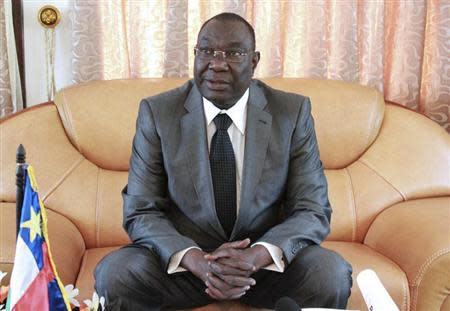Central African Republic leader in talks with militias

By Paul-Marin Ngoupana and Bate Felix BANGUI (Reuters) - Central African Republic's interim leader Michel Djotodia is weighing a possible amnesty for militias involved in Christian-Muslim violence that has killed hundreds of people, most of them civilians, in exchange for their disarmament. The country has been paralyzed by cycles of killing, torture and looting since Djotodia's mainly Muslim Seleka rebels seized power in the majority Christian nation in March. Djotodia has since lost control of his former fighters whose abuses have led to the emergence of militias, known as the anti-balaka, meaning anti-machete in the local Sango language, opposing them. Over 1,000 extra French troops were deployed this month to try to stop the violence that has displaced over 680,000 people - nearly one-seventh of the country's inhabitants - according to the United Nations. The former rebel leader said in a state radio address late on Saturday that he had been contacted by a representative of the mainly Christian and animist anti-balaka, who were demanding inclusion in the transitional government he leads. Elections are due to take place in 2015, however the government in Bangui currently exerts little control even within the capital. "The anti-balaka sent us an emissary and said they want to lay down their weapons and leave the bush, but they fear for their security. They gave preconditions ... They asked for an amnesty and entrance into government," Djotodia said. "Contacts are already established and we will pursue these exchanges in the interest of peace for all Central Africans," he added. "We don't see the harm, because this is the price of peace." The anti-balaka along with gunmen loyal to ousted President Francois Bozize, attacked the capital Bangui last week, triggering more killings and reprisals that have deepened inter-religious conflict. More than 500 people died and 189,000 have been displaced in the capital alone. A government spokesman that Djotodia was not excluding any of the demands made by the anti-balaka and was planning to reach out to other groups for similar talks - which might also mean the Seleka rebels. "The president will consider anything that will lead to peace in Central African Republic," Guy-Simplice Kodegue said. In a handwritten press statement seen by Reuters on Sunday, an anti-balaka group calling itself the Youth of the Anti-Balaka Revolution called upon its members to observe an immediate ceasefire to give peace talks a chance. However it was unclear how many fighters the group represented. Rights groups expressed skepticism over whether an agreement with the only loosely affiliated militias could bring peace. "I think the question is whether there is enough structure among the anti-balaka to deliver on promises to lay down arms" said Peter Bouckaert, emergency director at New York-based Human Rights Watch (HRW). EUROPEAN SUPPORT Central African Republic is rich in diamonds, gold and uranium but has seen little stability and France has intervened there more since independence in 1960 than in any other former colony. Paris has deployed 1,600 troops to prevent escalating bloodshed in what President Francois Holland has termed a humanitarian intervention. Two French soldiers have been killed since the operation began more than a week ago, and public support for the mission in France has waned. On Sunday, Foreign Minister Laurent Fabius said he planned to ask for more help from France's European partners. While European nations including Poland, Britain, Germany, Spain and Belgium have provided various forms of assistance, French troops are intervening alone. "That is a real big problem," Fabius told Europe 1 radio. "Tomorrow, I'll go to the Council of Foreign Ministers and I will ask (European partners) for stepped-up, more robust aid, including on the ground." The U.N.-authorized French military intervention has restored a degree of calm to the Bangui. And the African Union has authorized increasing its force in the country to 6,000 troops from 2,500. But pockets of violence remain and tit-for-tat killings on both sides continued. Near Bangui's municipal on Sunday stadium Reuters reporters saw the bloodied half-naked corpse of a young man in a dusty field, crouching face down in a pool of blood. "He was shot twice by Seleka fighters," said Vanessa Amina who lives nearby. HRW's Bouckaert said violence was also continuing outside of the capital, particularly in the town of Bouca, north of Bangui, and in Bohong, near the western border with Cameroon, where anti-balaka killed 27 Muslims last week. (Additional reporting by Nicholas Vinocur in Paris; Writing by Joe Bavier; Editing by Alison Williams)

